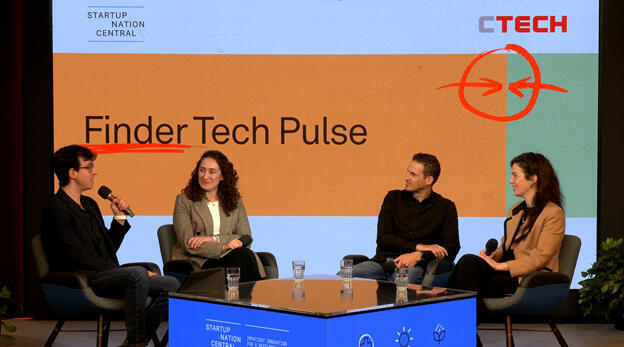
AI, drones, and the explosive growth of Israel’s dual-use defensetech industry
Startup Nation Central held a panel highlighting the growing sector and emphasized the benefit of dual-use companies to raise confidence and capital among investors.
SNC Panel - Ilana Sherrington-Hoffman, Perri Finkelstein, Aviv Shapira
(Photo: Calcalist)
“We're seeing a change in what defensetech has become as a sector. There's a reason why defense spending is skyrocketing worldwide, coupled obviously with the local and geopolitical concerns that Israel is facing that has fast-tracked some of the inventions,” said Ilana Sherrington Hoffman, Director, Global Partnerships at Startup Nation Central. “It created a situation where there is battle-tested innovation being validated so quickly and at a speed and rate that we have not seen for a while.”
Sherrington Hoffman made the opening remarks during a panel at the Startup Nation Central offices celebrating Israel’s defensetech sector. She was joined on stage by Perri Finkelstein, Head of Business Development and Value Creation at Protego Ventures, and Aviv Shapira, Founder and CEO at Xtend, all of whom provided an overview of how the country - and the world - have responded to global events over the last two years.
“It has matured in a very quick manner over the past two years or so,” she continued. “That's when you also see the venture capital follow. So we're also seeing an increase in private investment into these different technological companies.”
Through its Finder platform, Startup Nation Central has recorded that the number of new defensetech companies being established doubled in 2024 compared to the year before, with the trend set to continue over the next few months. These include first-time founders and second-time entrepreneurs, often relying on dual-use strategies to find partnerships and raise money.
Startup Nation Central counts more than 300 Israeli startups that touch on defensetech in one way or another. “There are a lot of companies that are entering the defensetech sector in more recent times because they've realized that technologies from fields like health or infrastructure can suddenly become very relevant to the battlefield,” Sherrington Hoffman added. “They're entering into the defensetech relevance and that's made the sector bigger and more attractive.”
One such company that adopts dual-use strategies is Xtend, an Israeli startup that started as a games company and that transitioned to defensetech. Notably, its human-guided autonomous machine system was originally designed for drones but has been adopted by the IDF to help protect against Hamas in Gaza since 2019. Shapira previously worked at IAI, Rafael, and Elbit Systems and is now running his fourth company. “I have the privilege of actually saving lives,” he told the panel. “Many companies out there do amazing things, but saving lives I think is rooted in every one of the employees that work in Xtend… This is why we wake up in the morning.”
The defensetech sector in Israel has seen significant growth since the October 7 attack, where companies suddenly pivoted their technologies to help the military, government, or private industries with their protections and to catch up with the unfortunate progression of battle. The natural blend of companies adopting dual-use strategies has exploded in recent years, as well as the birth of new startups founded by first-time founders who are exiting the IDF after identifying pain points and addressing challenges through innovation.
“Similar to other industries, it sometimes takes a very big event to change the paradigm,” explained Finkelstein. “If we look at history, countries are usually geared up to fight the last war and not the current war. And what it takes is often a shock factor to adjust that way of thinking… I think the amazing thing about Israeli technology as it relates to defense is it's built, it's tested, it's iterated, and it's proven even before it hits the market.”
Finkelstein was speaking on behalf of Protego Ventures, Israeli first defensetech-focused fund. Founded in 2024 by Lital Leshem and Lee Moser, the fund secured $70 million in investment commitments within just two weeks and is expected to close at $200 million, exceeding its $150 million target due to high demand from U.S. institutional investors. Its first investment was in Xtend for $5 million. According to the panel, since sole defense companies may have longer-than-usual sales cycles, a strong background in civilian or commercial applications may speed up this process and instill confidence in investors or potential customers.
“Dual-use is not necessarily a different company. It's sometimes just a different marketing team and a different business unit,” added Shapira, who confirmed that Xtend has three business units within the company. Sherrington Hoffman at Startup Nation Central confirmed that this strategy may be essential to help the sector flourish in the future. “We're seeing more of a supply as well as an expansion of the dual-use strategy. So more companies coming into the sector and offering a lot of variety in terms of the solutions being offered,” she said.
All in all, the defensetech sector has seen a boom in Israel - and is set to continue so long as companies can speed up growth and sales cycles by adopting dual-use applications. A proven track record for software-based and IP-based companies may be the strategy helping bring more money into the ecosystem from investors, and ultimately, success on the battlefield and at home.
“Wars will be won by drones, AI, and robotics, and the battlefield is only getting more dangerous. And we need to create technology that is going to secure not just Israel's future, but the world's future,” concluded Finkelstein. “And so I think we're going to see a huge uptick in evolution in those three domains.”
You can watch the entire panel in the video above.

















